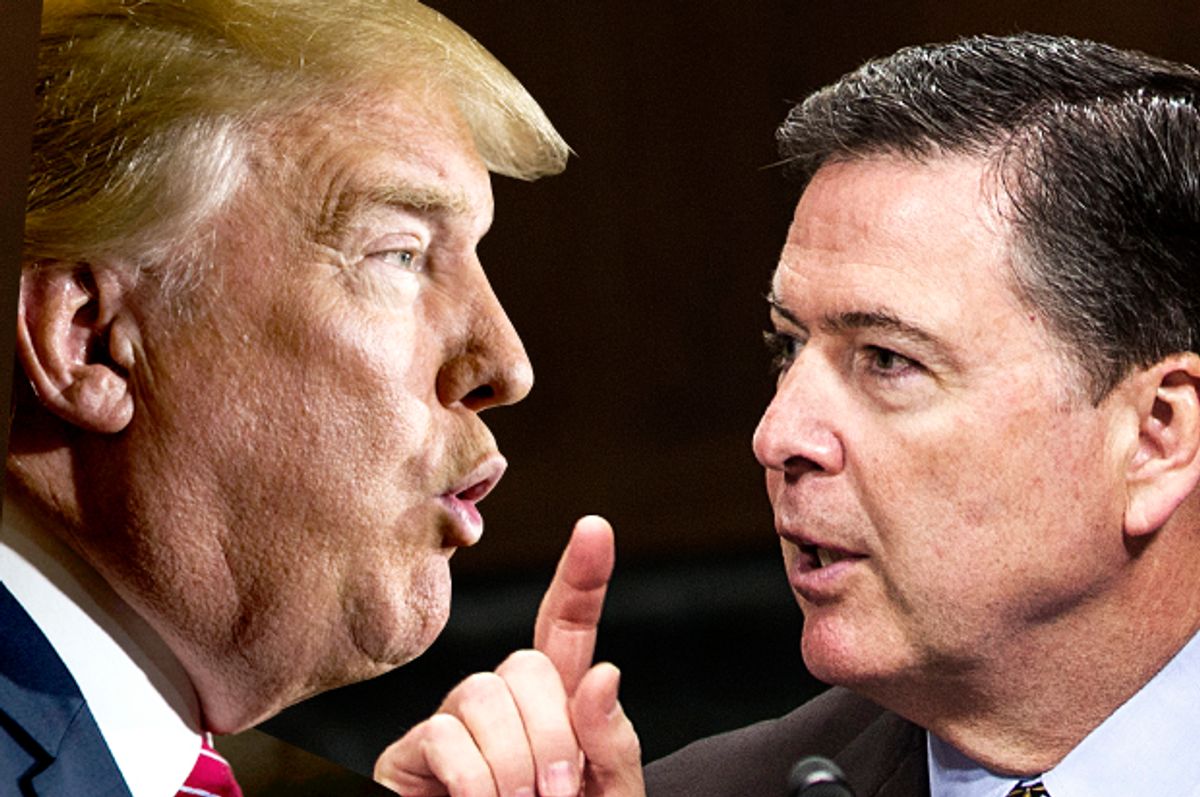Gaslighting, if you're unfamiliar with the term, refers to the manipulative practice of planting the seeds of doubt about how other people perceive reality, with the hope that in so doing you can get them to question inarguable truths for your own advantage.
This is what President Donald Trump tried to do with the American people with his tweet on Thursday morning denying that he had fired former FBI Director James Comey over the Russia investigation.
This is simply not true . . . according to Trump's own words.
"And, in fact, when I decided to just do it, I said to myself, I said: 'You know, this Russia thing with Trump and Russia is a made up story, it’s an excuse by the Democrats for having lost an election that they should’ve won,'" Trump told NBC News in May 2017, shortly after his decision to fire Comey. Trump also contradicted the reassurances of Vice President Mike Pence and then-White House Press Secretary Sean Spicer, who had been telling the public that Trump had fired Comey at the recommendation of Deputy Attorney General Rod Rosenstein over his handling of the Hillary Clinton email scandal.
When pressed by host Lester Holt on the details surrounding Comey's firing, Trump became vague and tried to avoid the question.
"I just want somebody that's competent. I am a big fan of the FBI, I love the FBI. As far as I'm concerned, I want that thing [the investigation] to be absolutely done properly," Trump said.
He added, "When I did this now I said, I probably, maybe will confuse people, maybe I'll expand that, you know, lengthen the time because it should be over with, in my opinion, should have been over with a long time ago. Cause all it is, is an excuse but I said to myself, I might even lengthen out the investigation but I have to do the right thing for the American people. He's the wrong man for that position."
There was also this conversation that Trump reportedly had with Russian officials one day after he fired Comey, as reported by The New York Times.
“I just fired the head of the F.B.I. He was crazy, a real nut job,” Mr. Trump said, according to the document, which was read to The New York Times by an American official. “I faced great pressure because of Russia. That’s taken off.”
Mr. Trump added, “I’m not under investigation.”
The conversation, during a May 10 meeting — the day after he fired Mr. Comey — reinforces the notion that the president dismissed him primarily because of the bureau’s investigation into possible collusion between Mr. Trump’s campaign and Russian operatives. Mr. Trump said as much in one televised interview, but the White House has offered changing justifications for the firing.
At the time that Comey was fired, the White House released a statement which argued that the president had terminated the FBI director at the recommendation of top officials at the Justice Department.
Today, President Donald J. Trump informed FBI Director James Comey that he has been terminated and removed from office. President Trump acted based on the clear recommendations of both Deputy Attorney General Rod Rosenstein and Attorney General Jeff Sessions.
“The FBI is one of our Nation’s most cherished and respected institutions and today will mark a new beginning for our crown jewel of law enforcement,” said President Trump.
A search for a new permanent FBI Director will begin immediately.
In memos that Comey took during his meetings with Trump after the 2016 presidential election and during the early months of Trump's presidency, the then-FBI director recalled how Trump asked him if he could "see your way clear to letting this go, to letting Flynn go," according to The New York Times. The president also met one-on-one with Comey on another occasion during his presidency and demanded that the FBI director pledge his loyalty, according to CBS News. When Comey began to buck against the request and told Trump that he would only promise his "honesty," Comey finally agreed to a compromise when the president asked instead for Comey's "honest loyalty." Comey assented to that request.
Trump's tendency to gaslight has been noted in the past, including by his fellow Republicans.
"Rather than answer any questions directly about the matter, Trump advances his narrative, often while denying any responsibility for it," Amanda Carpenter wrote in Politico in January. "His statement to NBC’s Lester Holt about firing Comey is a classic example. 'And, in fact when I decided to just do it, I said to myself, I said you know, this Russia thing with Trump and Russia is a made-up story, it’s an excuse by the Democrats for having lost an election they should have won,' he said. In other words, he fired Comey because of the Russian investigation but denied there was any wrongdoing with Russia. This tactic has similarly played out with #ReleasetheMemo. Republicans have widely advanced the narrative that various abuses were committed, but denied naming anything specific, citing security concerns with releasing the material."
She later concluded, "There is always a purpose to Trump’s gaslighting. Trump’s firemen on Capitol Hill know their mission. Whether they succeed or not depends on our ability to see through the smoke. At this point, the future seems hazy."
The main question here is whether the media will have the courage to cover this story accurately. In an era when "alternative facts" and "fake news" have become popular epithets, there may be people inclined to believe Trump's recent claim that he didn't fire Comey over the Russia investigation. Yet the president's own words on the matter are inarguable; there is no denying either that he said them or that they were intended to convey that the Russia investigation was precisely why he fired Comey.



Shares